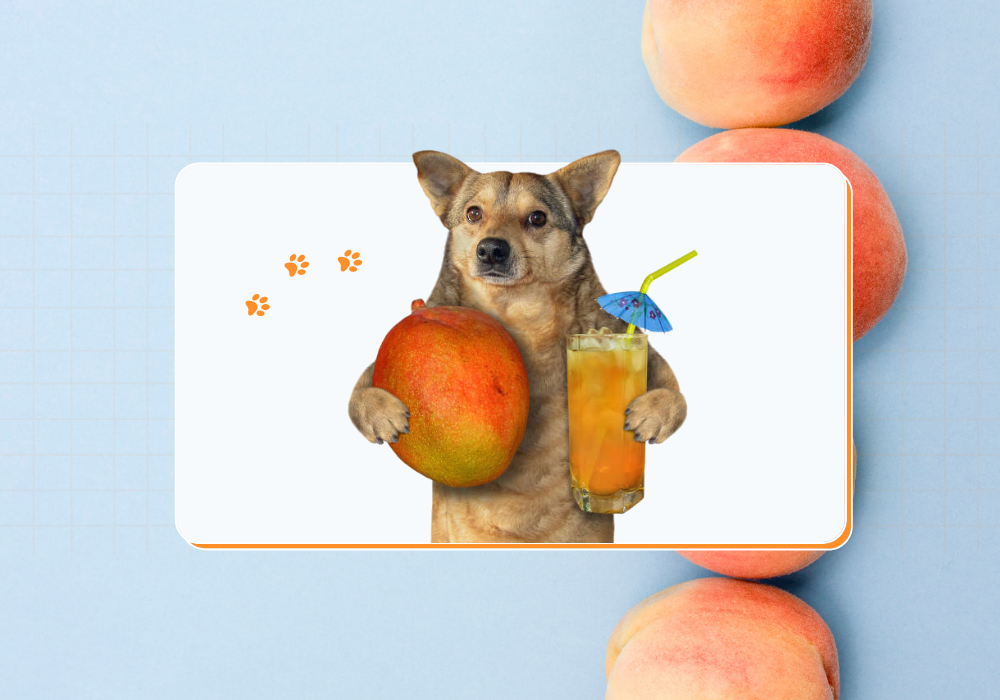Can Dogs Eat Mangos?
One of the most commonly asked questions on Reddit is, “Can a dog eat mango?” It’s an issue that has puzzled people for many years. The answer, however, is quite simple: yes, they can eat mango.
Just be sure to prepare it properly! Be sure to peel the fruit first and then remove any large chunks or seeds. You can also use a blender or food processor to ensure that it’s pureed enough before giving it to your pup. Some people choose to blend up pureed mango with water before feeding their furry friend; this way, you add lots of hydration without the extra sweetness.
You can also use just the mango flesh unless your dog is extremely picky. Sometimes, dogs can’t tell that there are even any pieces of mango in their food if they’re pureed well enough.
Again, always make sure that it’s 100% pureed before giving it to your puppy, and remember too that you shouldn’t give your dog pineapple or mango while pregnant. Dogs are ruminants, which means they digest food differently than other mammals.
While other humans often use teeth to grind their food into smaller pieces, dogs are ruminants who swallow their food whole. As a result, fruit could get stuck in their digestive tract and cause serious problems.
Are mangoes good for dogs?
When you’re wondering whether something is safe for your dog to eat, you should ask yourself, “are mangoes good for dogs?” and “can dogs eat mango?” You may have heard that mango is very nutritious, but does it have any real food benefits for your dog? The answer is yes.

Mango is a sweet fruit high in carbohydrates, which helps keep your canine friend’s blood sugar levels stable. They also contain antioxidants and vitamins such as A and C, folate, and potassium. It’s also high in fiber, which helps to reduce the amount of fat that your dog absorbs into their bloodstream.
So while mangoes aren’t technically “dog food,” they can be a good source of nutrition for your pup. If you’re concerned about the ingredients in their food, it’s pretty simple to find homemade dog food recipes with mango on the label. Remember, however, that it’s essential to make sure that your dog is getting other sources of vitamins and nutrients.
Here are just a few benefits of giving your dog a mango:
- Mangoes are a healthier alternative to typical dog chews
- A mango is ideal for dental health because it’s textured, and the acidity helps break up tartar.
- A mango promotes a healthy muscle tone with its high levels of potassium.
- Mangos are full of vitamin C.
- Mangos are a healthy source of energy.
Don’t forget that mangos are suitable for your pup, but they’re great for humans! Remember to eat one before you take a bite out of it. But don’t let that stop you from snacking on these juicy and delicious treats.
While mangoes are nutritious, they’re not the best source of vitamins and minerals. As we mentioned above, they’re also very high in sugar which can spike your dog’s blood sugar levels and give him diarrhea. It’s essential to combine mangoes with other fruits or vegetables if you want them to be a part of your furry friend’s diet.
Can I feed my dog mango bones?
If your dog loves chewing bones and having fun with toys, you may wonder whether or not he can eat mango bones. When it comes to the answer, the answer is yes! You can feed your dog mango bones or any other type of bone. Bones are a great source of minerals for your dog, and they help keep their teeth healthy as well.
For this reason, many vets recommend giving your pup bones from time to time. Just be sure that you don’t give them too large of a bone (like a pork shoulder!) since it could obstruct if he swallows it. Instead, stick with smaller bones like chicken wings or pigs’ feet!
What about mangos and dogs with allergies?
You may also wonder whether or not mangos and dogs with allergies can eat mango. The answer, of course, is yes! While mangoes are rich in fructose, they do not cause any side effects that other fruits like apples or peaches do.
High apples or peaches can cause almost immediate allergic reactions in dogs, making their skin itch and ears red. On the other hand, Mangos will not cause these issues; they don’t contain any allergens.
Therefore, it’s completely safe if you want to use mangos as an occasional substitute for those other fruits in your dog’s diet. Just be sure to avoid giving her too much mango, and always make sure that it’s wholly pureed before she eats it!
You’ll also want to keep in mind that excess amounts of sugar can cause severe health issues for your dog, so keep your pup’s diet balanced and moderate.
How many mangoes can dogs eat?
No more than 1-2 mangoes because they are high in sugar. Mangos can be toxic to dogs in large quantities. If your dog consumes many mangos at once, he could have severe stomach problems and potentially slip into a coma from the sugar overload. A better way to give him the fruit is to feed him some sliced mango chunks or pass it over for an occasional sniff.
If you cut the slices into small chunks and pass them over for your dog to sniff, he can probably eat them with no problem. But remember, the amount of fruit in a slice is still high in sugar and should be given sparingly, if at all.
How to Feed Your Dog Mango?
Before adding mangos to your dog’s diet, consult with your vet to ensure that the fruit will not cause an allergic reaction.
Cut up the mango into small cubes, then microwave for three minutes or until soft enough to eat. Mash the mango, then mix it into wet dog food or drizzle on top of dry kibble. Feed whenever you feed your dog food for at least one week.
You can also give mangos as treats, but only give one every two to three weeks. While mangos are packed with vitamins, minerals, fiber, and other nutrients, too much of a good thing can lead to digestive upset. If your dog eats more than one mango per week for at least three weeks, it’s time to cut back.
Mangos are not usually fed as treats because their smooth texture is difficult to prepare. However, if you want your dog to try mangos as a treat or are concerned that he might be allergic to the fruit, you can also steam them by simmering the pieces in a bit of water for approximately three minutes.
If you are feeding your dog mangos for the first time, oversee her while she eats. She may not like the taste of the fruit, in which case she will stop eating it after a while. If she seems fine but becomes lethargic afterward, contact your vet immediately.
Mangos are a great way to keep your dog healthy, especially if he’s picky about his food. Mangos are inexpensive compared to other fruits and vegetables, making them an economical way to ensure that your dog is getting all of his nutrients. This is especially important for dogs not getting enough exercise since they don’t burn off calories through exercise.
One of the main features of mangos is their high Vitamin C content. Vitamin C strengthens teeth and bones, helps break down food to make it more absorbable, and fights off diseases like heart disease.
Mangos are always lovely to have around because they are tasty and nutritious. Use them as a healthy treat for your dog, or eat them yourself to give your body some minerals and vitamins. By adding mangos to your dog’s diet, you can help him stay healthy while putting some added flavor into his life!
Can all dogs eat mango?
Yes, mango is safe for dogs. Very healthy. But it’s essential to keep the following things in mind:
- If your dog has sensitive stomach or digestive issues, you’ll want to feed them small amounts of mango throughout the day and only give them fresh fruit (not canned) foods. This should also go without saying (and many people do say it), but don’t give mango whole to your furry friend. It’s OK to cut up or shred it into small pieces.
- Mangos are rich in fiber, so if your dog is suffering from a bowel disorder or a bout of diarrhea, you should hold off on the mango until they’re feeling better.
- Mangos can aggravate certain medical conditions in dogs, such as pancreatitis and kidney disease. If your dog has either condition, it’s best to avoid mango altogether or ask your vet for input first.
- Some dogs can contract a rare but severe mango allergy from the fruit. Some of the symptoms include facial swelling, rashes and itching, difficulty breathing, and severe digestive upset. If you notice signs of an allergic reaction in your dog after they’ve eaten a mango, speak to your veterinarian.
In short
Mangoes are a great source of natural sugar and vitamins that can benefit dogs in various ways, but the dosage is critical. More is not always better! Mangoes are often seen as an exotic food for humans, but they have a long history of being part of the canine diet. Evidence suggests that dogs were introduced to mango outside the New World. The properties in mango are also said to be beneficial in helping dogs cope with heat exhaustion if they’re exposed to temperatures too high for too long.
Related Posts
- How Smart Are Hamsters? (It May Surprise You)
- Can Dogs Eat Mangos?
- Do Dogs Get Tired of Barking? (The Fact May Surprise You)
- Can Dogs Eat Marmite? (Everything You Need To Know)
- 21+ Best Brown Cat Breeds You Should Know
- Want a Pet Lobster at Home? (Know All Facts)
- Why is My Cat Twitching in His Sleep?
- What Smells Deter Cats From Peeing? (It May Surprise You)
- Why Do Cats Scream When Mating? (This May Surprise You)
- Why Are My Cats Ears Hot? (Everything You Need To Know)



